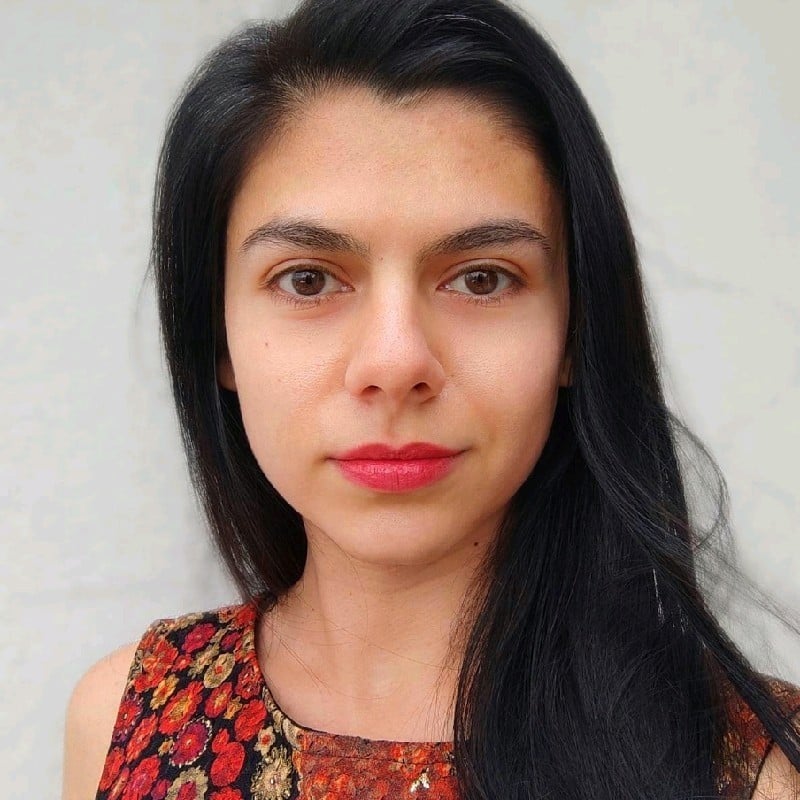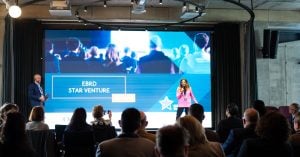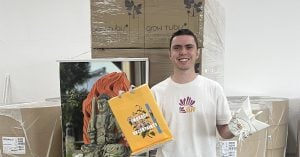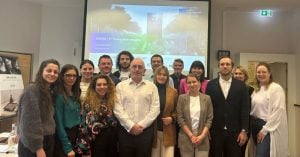The thick, green mantle of the tropical rainforest hides the heart and soul of the jungle. The Congo Basin, covering 80 percent of the territory of Gabon, is home to the African Forest Elephant, also known as “the mega gardener of the forest”.
As elephants roam through the jungle going through their daily routine of digging the soil for roots, munching on leaves, and riding down smaller and weaker trees, they preserve and maintain the balance of the ecosystem. Their destructive habits cause more good than harm. They give space and resources for larger trees to flourish and increase in size, as they capture more carbon with their leaves and store it in their trunks.
The impact of the elephants is significant – they contribute to the rainforest’s net increase of carbon capture and sequestration equivalent to the annual CO2 emissions of 2,047 petrol cars. It turns out that forests where elephants live capture and store 7 percent more carbon in comparison to forests where they are not present.
In September 2020, the IMF (International Monetary Fund) published a research estimating that each elephant contributes to carbon sequestration services worth more than $1.75M over a lifespan of 60 years.
In the face of climate change, preserving and protecting these creatures is crucial for maintaining ecological balance and biodiversity. Despite this fact, these animals are critically endangered, facing extinction by the poachers (their ivory can be sold for around $40,000 on the black market). The International Union for Conservation of Nature gives a concerning prediction that the African Forest Elephants are likely to go extinct in 10 years.
As if poachers don’t do enough harm, local farmers also add up to the horrifying statistics. They shoot down elephants that trespass their land and ruin their crops due to the lack of fences around national parks.
The only safe haven for the elephants are park rangers and local communities. However, their mission and jobs can be very difficult at times due to poverty, local corruption, and bribery attempts.
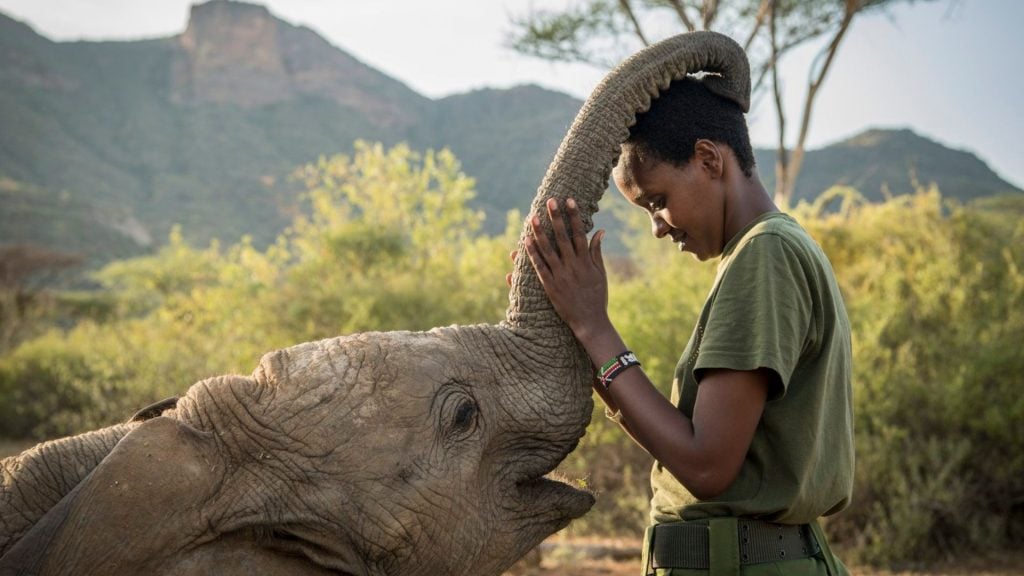
It is a matter of economy
In an economy, where everything is measured in dollars and cents we have to put a price on the species and translate their benefit to monetary value in order to convince the countries to protect them.
The problem posed by the forest elephants of Gabon has inspired the creation of Rebalance Earth, a project that takes an innovative and thorough approach to the protection and preservation of biodiversity. At a webinar from earlier this year, the founders, their partners, and volunteers passionately share with the world how Rebalance Earth is planning to interconnect the carbon sequestration services of the elephants, the carbon offset market, and local communities in a win-win-win model.
The 3 founders, Ralf Chami, Walid Al Saqqaf, and Ian Redmond, firmly believe that as a society, we can do a lot for our planet. The process will be long, but small steps matter.
Ralf Chami, an economist by education, says that traditionally businesses tend to regard nature as an externality. They do not take into account their impact on it when signing deals and if they harm the environment they are just sanctioned later. This has to change. Chami talks about a new economic paradigm in which nature is present and no business decision can be taken at the expense of the environment. He argues that markets have to be included in the equation when taking measures in the fight against climate change. It is our duty to translate the value of nature into a language that markets can understand so that they can join forces with activists and organizations with the common goal of saving the planet.
“Today we have a market for a dead nature, but we do not have one for living nature. What does that say about our values as a society? We value nature only when it’s dead and for me, that is simply unacceptable”, Walid Al Saqqaf, CEO of Rebalance Earth and a father of two, bitterly remarks.
Rebalance Earth is a project inspired by the idea that climate change and preserving biodiversity is an interconnected problem that needs an interconnected solution. The equation includes fighting poverty, creating an economy where all resources are used in a sustainable way, and involving markets that can provide the resources needed to embark on this journey.
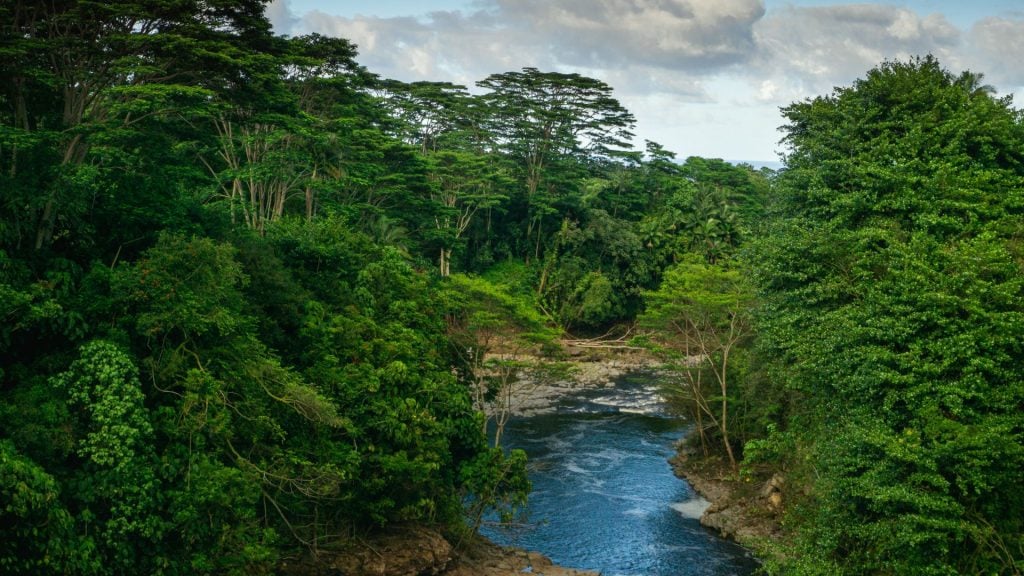
It’s a high time that we Rebalanced Earth
Rebalance Earth aims to use blockchain technology, IoT, and AI to incentivize the preservation of biodiversity and keystone species whose way of life and interaction with the forest have a significant impact on capturing carbon and recovering ecological robustness.
The goal of the pilot version of the project is to enable local communities and rangers of Gabon to protect the African Forest Elephants. Then a market for the additional captured carbon emissions will be created. The idea is to build a circular economy where the elephants’ carbon capture and sequestration services can be sold to organizations that want to offset their carbon footprint. And in turn, the raised funds flow back to the community by opening jobs, increasing wages, and building infrastructure that keeps the elephants safe. This creates an incentive for local people and rangers to keep taking care of the habitat and the well-being of the animals.
All of this happens through tokenization of the carbon captures and with the help of smart contracts. A combination of IoT sensors and AI is used to track each elephant and estimate its contribution to the maintenance of biodiversity. The information gathered from the sensors is turned into a web3 token. Since the tokens live on the public ledger all investors have full traceability and transparency of how the funds are used.
Trust is needed to create great partnerships
Rebalance Earth works in partnership with R3, an American blockchain solutions provider, and INDUSTRIA, a UK-Bulgarian private blockchain company. Their partnership is based on many years of trust and mutual work on common projects. R3 even chose Bulgaria for its first R&D hub in Eastern Europe.
The Recursive spoke to the Bulgarian team of INDUSTRIA – Kalina Tonkovska, Business Operations Manager, Boris Nikolov, CTO, and Nino Bonev, Team Lead, that works side by side with Rebalance Earth to get insights on how technology is helping protect biodiversity.
The Recursive: How does the Rebalance Earth business model work?
Kalina Tonkovska: It is a B2B business. Companies are purchasing carbon credits. And through these carbon credits, Rebalance Earth opens jobs for rangers and people who take care of the elephants on the ground (Ed.note the elephants help sequester the carbon). We turn to companies that can commit to a net-zero carbon footprint. So, this is the benefit they’re getting.
What is the tokenomics of the project?
Nino Bonev: Tons of different studies have been used in order to identify the model for the platform. But if I can summarize it in a sentence, every day that an elephant is well and is being detected through different tools using IoT devices or rangers reporting that the elephant is healthy, it is calculated that the benefit for this day is roughly around $80. So, any day that we identify that an elephant is well, we create a token. For any company that wants to go into the offsetting market and buy tokens using the Rebalance Earth platform, each token costs $80.
Boris Nikolov: What is worth mentioning is that there are additional tokens in the system that are being used for paying the rangers that take care of the animals. The already mentioned Eco tokens are issued every day when an animal is sighted and sold to companies. There are also Currency tokens that are being issued and allocated to rangers, and other society members as a result of the Eco tokens sale, and can be used to pay for certain things.
What payment system/method will be used, and what goods and services can local people buy?
Boris Nikolov: The platform is just about to be officially launched in a pilot and a lot of planned functionalities are yet to be added. Transferring funds for communities and rangers is currently a manual, off-system process. Rebalance Earth provides process flows with human verifications, confirmations, tracking, and reporting. Automating the flows and adding payment systems (or wallets) are planned for the next phase of the project. In July we will be able to share more with the public.
Why is blockchain an important piece of the puzzle?
Boris Nikolov: Since we’re talking a lot about tokenization, blockchain is kind of the natural way to go. In this case, we have chosen Corda as the blockchain platform being permissioned and a private one. A very serious aspect of the system is data security. First, because of keeping the animals secure and not exposing too much information that can be used in a bad way. On the other hand, we have all the tokens, financial transactions, and so on. Of course, everything needs to be very secure. So, this platform and the blockchain matched the criteria that we need.
Nino Bonev: Also, blockchain is great for transparency and traceability. The very first thing that we discussed with the Rebalance Earth team was everything to be transparent. The rangers, the community, and everyone that is in touch with the real elephants, they could see in real-time all the different actions that are taking place and they can trust this platform.
How are you planning to attract investors and especially the ones that are not interested in ESG (Environmental, social and corporate governance) investing?
Kalina Tonkovska: While this is a Business Network, first and foremost, it is related to environmental biodiversity and sustainability. So, I think that businesses/investors will take part in it. They take part in it first and foremost, because they want to help biodiversity. So it’s not so much about trying to convince them.
The other thing is that regulations are becoming bigger and bigger, for the better in this case. While currently, it’s sort of a social pledge to say that you want to have a net zero carbon footprint, in the future, it will not be something that you get to choose. It will be a goal of the companies. Companies that want to decrease their carbon footprint have two choices – either proactive or reactive. Being proactive, they have to change something fundamental about their business. And sometimes it’s very hard because the biggest polluters are transportation and electricity, so it’s very hard to amend your business in a way that you can significantly decrease your carbon footprint. Sometimes for companies, especially in tech, it’s a better choice to have a reactive approach and carbon offsets.
What kind of carbon offsetting certificates do you provide?
Kalina Tonkovska: We are planning on implementing the Verra Standard by next year.
Tell us more about your win-win-win model (nature, government, local community).
Kalina Tonkovska: Luckily, we have a lot of partners in this project. We work with the International Monetary Fund. We also have partners from stock exchanges and banks. So, already organizations are involved as well as payment providers. And we’re planning to expand a lot. By the way, it is a very good point to why Corda is a good choice for DLT (Distributed Ledger Technology) because it is made to matter more the more participants are involved and the weight of that networking increases. On the one hand, we already have a lot of organizations having pledged and being actively involved in the first phases. On the other hand, the local community is open and very proactive and of course, they want to open more jobs and help biodiversity. A lot of companies reach out to us because of their will to be involved in ESG.
How are you planning to use the raised funds to transform the habitat of the animals and to improve the living standard of the local community?
Kalina Tonkovska: Our plans indeed are related to improving the local community – initially by opening jobs for rangers in the area of Gabon and in turn fighting poverty. As we expand the platform and endangered species, we will be looking to raise the standard of living in other ways too.
This is an opportunity to create value not only for nature and the environment, like a lot of non-profit causes do, but this is an opportunity to create value as well for the companies. We plan to scale up and include a lot more species other than elephants, like orangutans or whales. This offers the possibility to have a diversified portfolio with environmental stock, which is quite exciting.
Why is it important for more companies to turn to ESG investing and do you believe that this is enough to fight climate change?
Kalina Tonkovska: Investing in ESG is important on one hand for social and environmental reasons – if the business sector doesn’t get involved now, we won’t have a future to live in later. On the other hand, climate change has affected certain businesses more than anyone envisioned. The truth is it is a chain reaction and while you may not care for the first issue, the following ones will reach you in one way or another. The carbon offset market offers the opportunity for companies to help fight climate change and prevent any further losses to the community, species, and the overall environment. While there is not one single solution that will solve climate change, Rebalance Earth is a fundamental step in doing so.


